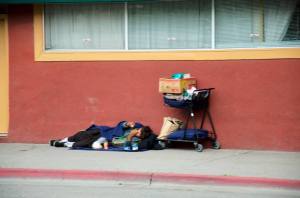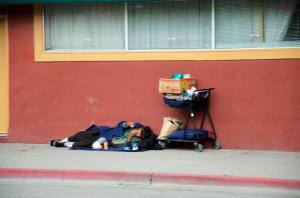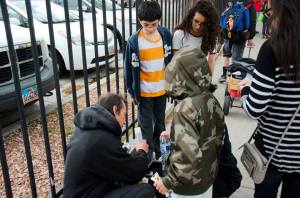I do what I do to ease an ache in my heart and mind. I do what I do to ease the ache in the hearts and minds of others. This means I write to ease what I feel, and to ease what others feel. It means I serve others to ease what I feel, to ease what others feel. Granted, there are other reasons that are equally as important for why I do what I do, but writing and serving are two extreme passions of mine that stem from a deep-rooted understanding of human need, ache, and feeling.
Such a motive often makes the work a person does bittersweet, challenging and yet simultaneously rewarding. Recently in my life a question I’ve always struggled with has crept back in, and that is namely, the question, How do we ease the suffering in existence, and more importantly, how do we understand it and seek to understand it? Buddha has his own answers with the Four Noble Truths, the Eightfold Path, and his statement that all life is suffering, and we must remember he did not come to these conclusions lightly. For me, personally, I have understood and been made to understand that suffering brings out the best in people and makes us honest and truthful to our experiences and our needs. People can connect when there is pain. Pain is the impetus for peace and compassion. Pain is the beginning of love. Pain plants the seeds of kindness and empathy. Pain is ironically a blessing, even though it is not required for growth. Without suffering, we wouldn’t understand nuance and depth, the gray areas of our complex existence. We wouldn’t understand all that exists. When I serve others, I feel both bitterness and sweetness: I feel bitterness because I hurt when I see others hurt, but I feel sweetness and light when I see that I have served another human being and brought a smile. To me, nothing is better than this.
I got to serve with close friends of mine, and Jennifer. This in the end only made a good situation better: My squad was self-governed and self-motivated, and happy to be where they were. This eased the load on me, which was good because all of this had come from a negative experience a while back that uprooted how I looked at what I did/do. This ease of leadership was also greatly important because I was recently feeling devalued by external forces, as though my work, both humanitarian and my writing, was unimportant and valueless.
But my writing is not valueless. Fred took a photo with me of my early copy of In the Garden of Evil. He brought out my best smile. The book isn’t out yet but it will be out soon enough, but I was busy showing people because I was proud and wanted to share. And many people expressed interest in the book, which made me feel loved and valued. The book asks important questions, questions of how do we know if we are doing the right thing? Something that has certainly been on my mind, by asking these questions of commitment and sacrifice: What are we willing to sacrifice for others, what are we willing to do to achieve the ultimate good?
I wrestle with these questions because like Buddha, I want to know. Like Christ, I want to love unconditionally. I don’t think these are negative things, can in fact be transcendental and bring us immense peace and enlightenment. I don’t think these are pointless goals to reach for. I think we must ask these questions if we are to be honest with ourselves and with others.
Put succinctly: Our outreach for May of 2016 was incredible. We had a few funny moments, like when we took a detour to take Trax and realized we were going the long way around and thus wasting time, only to find out later that we had to wait fifteen minutes for the train to come, leading us to decide to just walk to the library and feed the streets immediately: No longer were we trusting the established order, we joked. It was funny when it totally started pouring on us and none of us were prepared. It was funny when we took a wet dog photo because we knew we were in trouble. It was funny when one of my close friends kept making me laugh with his good-natured spirit.
At one point, this good friend of mine shared an experience he’d had. Basically, he met a homeless woman at the library, and she was happy to receive our burritos. She told us about an encampment just up above us. We went there, and the bitterness of seeing a literal homeless encampment, of people using tarps to stay dry from the rain, broke my heart … the sweetness and light of realizing that these people represent hope and compassion. We slowly broke down barriers of fear and distrust, broke down skepticism and suspicion, with this self-motivated and kind group, and the automatic leadership that came as a result of our compassionate approach.
What do you say to such beautiful and heartbreaking experiences such as these? I’m not sure there’s really much you can say, in the end. I just finished reading a book called Dream Boy by Jim Grimsley, a powerful novel with a flare for biblical references relating to sacrifice and commitment, and a need to express what it means to love unconditionally. The book uses the innocent and beautiful character Nathan to ask this question of, can we love unconditionally, and are we willing to sacrifice to do so? The book has a tragic ending, which drives this question further home in the most painfully necessary way. Yes, Nathan did love unconditionally, even though it broke his spirit in the end. If it breaks my spirit in the end, I know it would have been worth it, because I would have accomplished what Phoenix needs and desires for others: That is, to love unconditionally. Indeed, do we care about others, are we willing to sacrifice ourselves for a greater good, just like my characters in my book In the Garden of Evil? If the stakes are high, should that stop us?
I would of course say, no, it shouldn’t stop us. But such is the bittersweetness of what we do. I can admit, kind of a little sadly, that I felt lonely after the outreach, back at my apartment. The usual high I feel was not there. Why, you ask, after I had such a positive and life-affirming experience? This is a valid question, and it’s one I can’t answer easily. But I can say, it’s because I know it’s hard to love unconditionally. It’s because sometimes doing this work reminds me of my own mental anguish, of the ways in which I suffer as well and struggle to find asylum. It’s because I wish things were easier, but understand that they cannot be, but that we must nonetheless push forward and be there for others. Loving unconditionally. Being there for others without question, without judgement.
I know it’s ironic that I would feel lonely after such deep connection. But this is how it has to be sometimes. Because, indeed, it reminds us of our common humanity. I won’t lie that I feel sad at the effects of greed, mental illness, loneliness, oppression, economic disparity, suffering, abandonment, misunderstanding, hatred, etc. Perhaps this is why I gravitate towards The Legacy Initiative and homeless folk, because it brings out the best of us, and reminds us we aren’t alone.
And yet, knowing I’m doing good work, is exactly why I ironically feel alone: The act of being compassionate makes me feel lonely, as well as thinking generally about the present state of the world. But, you have to wrestle with these feelings, and you have to wrestle with these feelings because it is the best thing we can do. We must seek to understand, we must care to understand. We must be compassionate and kind. To not do so would be to betray our potential for helping the world be a better place.
This doesn’t mean we dwell solely on the pain of the world, of course. We don’t just blindly accept it, but we also don’t overquestion and overanalyze. But, by confronting it, and by choosing to confront it, and by not evading it, perhaps we fill something within us in the process, perhaps we help ease an ache in our hearts and mind. Perhaps we aren’t so abandoned anymore.
Perhaps, in a beautiful way, through service and compassionate outreach, we are unconditional in our love and regard for others. I suppose in that case, there isn’t much more you could ask for. It hurts to love unconditionally, and it always comes at a personal cost, but to do otherwise would be to miss out on an opportunity for healing and communion with others. We become what we value, and it is through my recent reflections that I have understood the subtle ripples that exist because of how others impact me and how I impact them, and again, it all stems back to the unconditional love we all have deep within us to share.
–Photo Credits to Fred Lane



